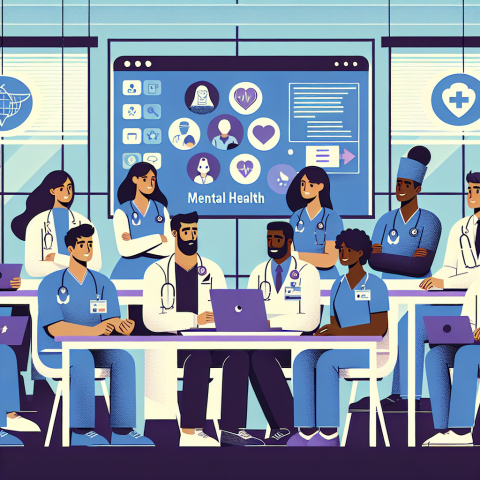Mental Health Training – When it comes to healthcare, we tend to focus a lot on physical health. It’s easy to get lost in diagnoses, treatments, and medications. But mental health? That’s where things can get a little tricky. I’ll admit it: I wasn’t always fully aware of how crucial mental health training is for healthcare professionals. Like many people, I used to think that health was just about the body—things like blood pressure, heart rate, and surgeries. But over the years, I’ve come to understand how vital it is for healthcare workers to be equipped with the tools to recognize and manage mental health concerns in their patients. Let me explain why.

Table of Contents
ToggleWhy Mental Health Training Is Essential for Health Care Professionals
Understanding the Silent Struggles
One of the first things I learned was how deeply mental health issues are intertwined with physical health. You see, for a long time, I was in the “just fix the physical stuff” camp. If someone had a broken leg, you fix the leg, right? Simple. But what happens when that same person has severe anxiety, depression, or even PTSD? The healing process becomes a lot more complicated, and without recognizing the mental health aspect, physical recovery can slow down, or in some cases, stop altogether.
A personal example of this came from an experience I had while volunteering at a local clinic. One of the patients, a middle-aged woman, came in complaining of chronic pain. The doctors were about to start prescribing painkillers when something in her history caught the attention of the staff. She had a past filled with trauma, including the loss of a child, and her constant pain wasn’t just physical—it was emotional too. Once we realized her mental health was playing a significant role in her physical pain, we were able to take a more holistic approach to her treatment. The pain didn’t disappear overnight, but with counseling and better mental health care, she started to improve in ways we hadn’t expected.
Recognizing the Need for Mental Health Training
So why should healthcare professionals be trained to recognize and address mental health issues? Well, I’ve seen firsthand how easily mental health issues can go undiagnosed or misunderstood in clinical settings. It’s not uncommon for healthcare professionals to overlook signs of mental illness, especially when they’re focused on a more tangible, visible condition. That’s where proper training comes in. If healthcare providers are equipped with the knowledge to spot signs of depression, anxiety, or substance abuse, they’re more likely to help their patients in ways that extend beyond the physical realm.
Take, for example, the case of someone who comes into the ER after a suicide attempt. If the healthcare professional is not trained to deal with mental health crises, they might focus solely on physical recovery, but not address the underlying mental health issues that caused the situation. This oversight can be fatal. With proper mental health training, healthcare professionals can intervene early, provide crucial support, and refer patients to the appropriate mental health resources. It’s not just about fixing bodies—it’s about saving lives in every way possible.
Practical Benefits of Mental Health Training
Let’s talk about the real-world benefits. If healthcare professionals, from nurses to doctors, have mental health training, they’re better prepared to offer empathy, avoid misdiagnosis, and reduce stigma. One of the biggest struggles in mental health is the stigma that patients often face. I’ve seen patients avoid seeking help simply because they’re scared of being judged or misunderstood. When healthcare providers are trained to handle mental health with sensitivity and care, they break down that stigma and open the door for patients to get the help they need.
But it’s not just the patients who benefit. Mental health training can improve the overall work environment in healthcare settings. Healthcare professionals are under constant pressure, and many are experiencing burnout themselves. When I started training in mental health awareness, I noticed that it helped me understand my own stress and frustrations better. I also learned healthier ways to cope with tough situations, which allowed me to be more patient and empathetic with my patients. That’s the thing about mental health training: it’s not just for the patients. It’s a tool for better self-care and self-awareness too.
How Healthcare Workers Can Get Mental Health Training
Now that we’ve established why this training is so important, let’s talk about how healthcare professionals can get this kind of training. Luckily, it’s becoming more accessible than ever. Many organizations now offer courses specifically designed for healthcare workers, covering topics like recognizing mental health conditions, how to de-escalate tense situations, and how to provide appropriate mental health support. These courses can be done online, in workshops, or even as part of a certification program.
I’ll be honest—when I first heard about these types of trainings, I thought they would be dry and boring. But after attending a few, I realized how incredibly engaging and valuable they were. I learned practical techniques that I could implement immediately, like how to communicate effectively with patients who are struggling with mental health issues or how to recognize when a patient is at risk of self-harm. These are skills that no healthcare professional should be without.
A Long-Term Impact
The longer I’ve been in this field, the more I realize that mental health training isn’t a one-and-done deal. It’s an ongoing journey. Mental health awareness isn’t something that can be achieved in a weekend workshop and forgotten about. It’s something that needs to be continually nurtured and integrated into daily practices. Whether it’s attending annual refresher courses, reading up on the latest mental health research, or simply engaging in conversations with colleagues about mental health, the learning process is never over.
Here’s the kicker: When healthcare professionals are properly trained to address mental health, they’re not just improving patient outcomes—they’re helping to create a more compassionate and effective healthcare system. And, as I’ve learned over the years, that’s something that benefits everyone, from the patient to the healthcare worker to the broader community.
If you’re in healthcare, or if you’re a patient who feels like their provider isn’t acknowledging the mental health aspect of your care, I urge you to advocate for more comprehensive mental health training. It could make all the difference.







